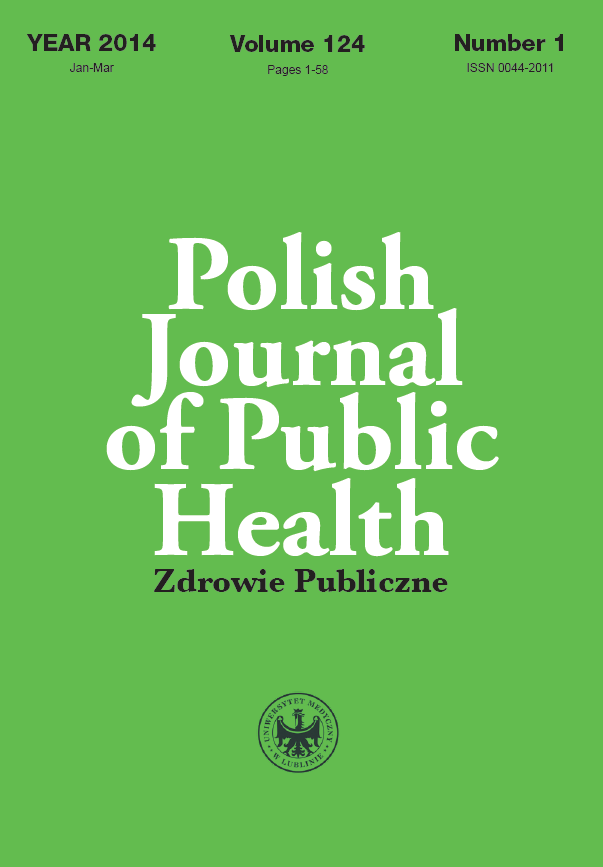Acceptance of the illness and the quality of life of patients with breast cancer
DOI:
https://doi.org/10.2478/pjph-2014-0001Keywords:
breast cancer, acceptance of the illness, quality of lifeAbstract
Introduction. Breast cancer is the most frequent cancer diagnosed in women. Its treatment is a combined therapy and the sequence and time are established according to the accepted standards in Poland. Consequences posed by this disease include disorder in the physical, mental and social spheres in women. Adapting to cancer is very important for the process of treatment, and the acceptance of the disease is the determinant.
Aim. The aim of the study was to determine and compare the degree of acceptance of the illness and the assessment of quality of life among breast cancer patients during cancer treatment.
Material and methods. The survey included 85 ill people treated in a conserving way and 94 ill people treated by breast amputation. Patients after the surgical procedure were subjected to adjuvant treatment involving chemotherapy (90 women) and/or endocrine therapy (87 women). The study used standardized questionnaires EORTC (European Organisation for Research and Treatment of Cancer): QLQC-30 and the scale (AIS Approval IIIness Scale).
Results. The highest level of acceptance of the disease, so the best ability to adapt to cancer have those women who have undergone radical mastectomy and adjuvant hormone therapy during the treatment. The lowest level of acceptance of the illness, expressed as a negative assessment was observed in women after BCT and during chemotherapy treatment. The use of the EORTC QLQC-30 to assess the overall health and quality of life of patients allowed us to capture statistically significant differences in the percentages stating good health, with the relatively highest negative response rates which were observed in the subgroups treated with chemotherapy and hormone therapy. With regard to the highest quality of life, the percentage of negative responses was observed in subgroups treated with the use of hormone therapy and after mastectomy.
Conclusions. Good acceptance of the disease was obtained by women treated for breast cancer who have undergone mastectomy in the course of adjuvant endocrine therapy. The assessment of general health and quality of life was influenced by oncological treatment. Patients during chemotherapy and hormone therapy showed a negative impact of this form of treatment on overall well-being and functioning. Patients after mastectomy and during hormone therapy treatment showed a comparatively lower quality of life compared to a group of patients after BCT and during treatment with chemotherapy.
References
1. Raport na podstawie danych Centrum Onkologii – Instytut im. Marii Skłodowskiej-Curie, Warszawa; 2011. [www.onkologia.org.pl]
2. Aebi S, Davidson T, Gruber G, Cardoso F. Primary breast cancer: ESMO Clinical Practice Guidelines for diagnosis, treatment and follow-up. Annals of Oncol. 2011;22(Suppl. 6):vi12-vi24.
3. Bishop H, Chan C, Monypenny I, et al. Surgical guidelines for the management of breast cancer. Eur J Surg Oncol. 2009;35(Suppl. 1):1-22.
4. Cardoso F, Harbeck N, Fallow L, et al. Locally recurrent or metastatic breast cancer: ESMO Clinical Practice Guidelines for diagnosis, treatment and follow-up. Ann of Oncol. 2012;23(Suppl. 7):vii11-vii19.
5. Winczura P, Senkus-Konefka E, Jassem J. ,Polskie i międzynarodowe zalecenia dotyczące leczenia raka piersi. Nowotwory. J Oncol. 2013;63(1):63-4.
6. Juczyński Z. Narzędzia pomiaru w promocji i psychologii zdrowia. Pracownia testów Psychologicznych Polskiego Towarzystwa Psychologicznego. Warszawa; 2001.
7. De Walden-Gałuszko K. Psychoonkologia w praktyce klinicznej. Warszawa: Wydawnictwo Lekarskie PZWL; 2011.
8. Pleszewa A, Formanowska B, Kaczmarczyk K. Wpływ choroby na funkcjonowanie pacjenta i jego rodziny. Piel Pol. 2005;1(19):82-8.
9. Pers K. Zależność liczby i nasilenia objawów ubocznych chemioterapii od poziomu depresji i lęku u pacjentów onkologicznych. Psychoonkol. 2002;6(1):9-12.
10. Leppert W, Majkowicz M. Adaptacja Karty Oceny Bólu Memorial do warunków polskich: propozycja standardowego narzędzia służącego do oceny bólu i monitorowania leczenia bólu u chorych na nowotwory – doniesienia wstępne. Med Paliat. 2011;4:207-13.
11. Niedzielski A, Humeniuk E, Blaziak P, Fedoruk D. Stopień akceptacji choroby w wybranych chorobach przewlekłych. Wiad Lek. 2007;60(5-6):224-7.
12. Nowicki A, Ostrowska Ż. Akceptacja choroby przez chore po operacji raka piersi w trakcie leczenia uzupełniającego. Pol Merkuriusz Lek. 2008;24(143):403-7.
13. Tobiasz-Adamczyk B, Szafraniec K, Bajka J. Zachowania w chorobie. Opis przebiegu choroby z perspektywy pacjenta. Kraków: Collegium Medicum Uniwesytetu Jagiellońskiego; 1999. p.37.
14. [www.eortc.be/home/qol/files/C30/QLQ-C30%20Polish%20n.pdf/]
15. Juczyński Z. Narzędzia pomiaru w promocji zdrowia. Warszawa: Pracownia testów Psychologicznych Polskiego Towarzystwa Psychologicznego; 2001.
16. de Walden-Gałuszko K. Ocena jakości życia uwarunkowana stanem zdrowia. In: J. Meyza (ed). Jakość życia w chorobie nowotworowej. Wybrane zagadnienia Centrum Onkologii Instytutu im. Marii Skłodowskiej-Curie. Warszawa; 1997.
17. Herschbach P, Keller M, Knight L, et al. Psychological problems of cancer patients: cancer distress screening with a cancer-specific questionnaire. Br J Cancer. 2004;91:504-11.
18. Ogińska-Bulik N, Kozak G. Akceptacja choroby jako wyznacznika radzenia sobie z chorobą nowotworową u pacjentów opieki paliatywnej. Psychoonkol. 2002;6:21-5.
19. Wiraszka G, Lelonek B. Funkcjonowanie chorego z białaczką a akceptacja choroby nowotworowej. Stud Med. 2008;10:21-6.
20. Graja T, Gryczka R, Grodecka-Gozdecka S. Wybrane aspekty jakości życia kobiet leczonych z powodu raka piersi dwoma różnymi metodami. IV Ogólnopolska Konferencja:,,Diagnostyka i leczenie raka piersi”. Warszawa; 2005.
21. Piątek J, Krauss H, Gaik M, et al. Jakość życia kobiet po amputacji piersi. Przegl Gin Poł. 2004;4(4):173-7.
22. Fobair P, Stewart SL, Chang S, et.al. Body image and sexual problems in young women with breast cancer. Psychooncol. 2006;23:103-13.
23. Zegarski W, Głowacka I, Ostrowska Ż. Ocena jakości życia kobiet po mastektomii na podstawie standardowych kwestionariuszy: QLQ-C30 i QLQ-BR23 Nowotwory. J Oncol. 2010;60(6):532-5.


